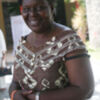Scholastique Mukasonga
Author of Our Lady of the Nile
About the Author
Works by Scholastique Mukasonga
Mukasonga 1 copy
Mukasonga: A Book of My Own 1 copy
Inyenzi ou as Baratas 1 copy
Emakume oinutsa 1 copy
Tagged
Common Knowledge
- Birthdate
- 1956
- Gender
- female
- Nationality
- Rwanda
France - Birthplace
- Rwanda
- Places of residence
- Nyamata, Rwanda
Butare, Rwanda
Burundi
France
Hérouville-Saint-Clair, Normandy, France - Occupations
- social worker
Members
Discussions
AFRICAN NOVEL CHALLENGE OCTOBER 2023 : NGUGI WA THIONG'O & SCHOLASTIQUE MUKASONGA in 75 Books Challenge for 2023 (November 2023)
Reviews
Lists
Awards
You May Also Like
Associated Authors
Statistics
- Works
- 17
- Members
- 883
- Popularity
- #29,019
- Rating
- 3.9
- Reviews
- 45
- ISBNs
- 74
- Languages
- 12
- Favorited
- 1



























The Publisher Says: When time-worn ancestral remedies fail to heal young Ikirezi’s maladies, she is rushed to the Rwandan hillsides. From her termite perch under the coral tree, health blooms under Sister Deborah’s hands. Women bare their breasts to the rising sun as men under thatched roofs stand, “stunned and impotent before this female fury.”
Now grown, Ikirezi unearths the truth of Sister Deborah’s passage from America to 1930s Rwanda, and the mystery surrounding her sudden departure. In colonial records, Sister Deborah is a “pathogen,” an “incident.” Who is the keeper of truth, Ikirezi impels us to ask, Who stands at the threshold of memory? Did we dance? Did she heal? Did we look to the sky with wonder? Ikirezi writes on, pulling Sister Deborah out from the archive, inscribing her with breath.
A beautiful novel that works in the slippages of history, Sister Deborah at its core is a story of what happens when women—black women and girls—seek the truth by any means.
I RECEIVED A DRC FROM THE PUBLISHER VIA EDELWEISS+. THANK YOU.
My Review: Patriarchy putting words in women's mouths. Colonial masters defining reality for the colonized. Big-god-industry fans denigrating anyone they can't control. Nothing new here.
Until Author Scholastique got hold of the reins. Then this buggy got movin' fast (under 150pp) and furious (women under patriarchal colonialist control got some rage). The action is, unsurprisingly for émigré Mukasonga, split between a Rwandan émigré before and after immigation to the US, and an unusual American woman healer. Ikirezi, whose encounters with African-American missionary and faith healer (of a sort) change her inside and out, leaves the suddenly-too-small world she was born into under the influence of Sister Deborah's...unconventional...take on religion. The meditation practice, the acceptance of the Divine's presence in the beliefs and actions of (especially female) Rwandans, all make Sister Deborah no sister to The Authorities.
Ikirezi maintains a deep connection to Sister Deborah's teachings even as she consumes a Western education and takes on an academic view of this experience in her past. She decides to return to Rwanda to determine the fate of the much-maligned Sister Deborah.
We then hear from that lady directly, learning about her painful, blighted past in the lead-up to an immense awakening experience: The protestant Savior is, indeed, coming back to judge the quick and the dead.
And she's a Black African.
Cat, meet pigeons. Sister Deborah is a profoundly disturbed person, in my view, claiming that a divine avatar is speaking to her; there's meds for schizophrenia now, and she really needs 'em. The one reason I'm not eviscerating this book is that Author Scholastique doesn't take sides, she simply evokes the experience (most powerfully of baptism) that Sister Deborah undergoes as well as provides for the downtrodden women she ministers to. I'm not so constituted as to feel religious awe, nor do I have a clawing need for "community" among believers. In fact, the modern religion-equivalent called "fandom" is too much for me most of the time. The story, then, wastes its lovely magical-realist prose flights on me. They're nice and all, but no gooseflesh over here.
I offer four stars to a story I'm sympathetic to, but not much moved by, because like Kibogo, my guide is a deeply knowledgable person whose experiences allow her to communicate to me both a sense of consensus reality's view of the action, and the lived experience of people deeply Other to me. I'll never not appreciate, value, and celebrate that gift when I'm offered it.
It doesn't hurt that I find all of her writing I've read so far fully worth my eyeblinks.… (more)